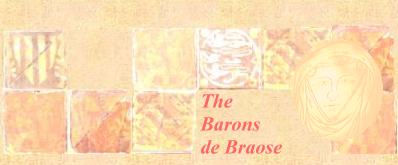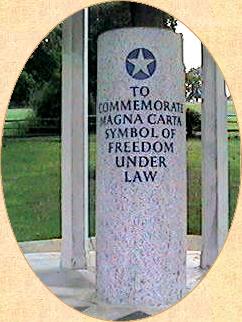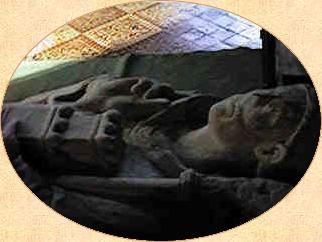
Magna
Carta

Giles de Braose returned
from exile in France with the archbishop of Canterbury, Stephen
Langton and other churchmen. They landed at Dover in 1213 and
met the king at Winchester, where he received absolution. With
his most bitter enemies back in the country, John soon faced
renewed unrest.
Bishop Giles de Braose
and his brother Reginald, joined by prince Llywelyn, ravaged
the king's march lands and won back the lost de Braose castles
in Wales. Their success served to rally an army of rebel barons
from the northern shires and they joined together at Northampton.
The revolt took on the
character of a crusade and the army named itself The Host of
God and Holy Church. The rebels failed in their efforts to take
Northampton but won Bedford. The king avoided personal confrontation
with the rebel army in the hope that its zeal would burn out.
To his dismay it then took London, receiving an enthusiastic
welcome from the citizens, and demanded to meet the king to agree
a charter of rights.
The army harassed the king
until he finally met with its leaders at Runnymede,
outside Windsor in June 1215. The Magna Carta stated that: "No
free man shall be arrested or imprisoned or dispossessed or outlawed
or exiled or in any way brought to ruin, nor will we go or send
against him, unless by the lawful judgement of his peers or by
the law of the land".
In the fields of Runnymede
the spectres of Maud and her son, who starved to death in a dungeon
of the castle nearby, and the fall of William de Braose, must
have concentrated many minds. In the ranks of younger sons and
lesser knights who gathered at the negotiation of Magna Carta
was William and Maud's sixteen year old grandson, John, the de
Braose heir.
 The barons
demanded the return of the de Braose lands to Giles, with the
wardship of his nephew John. The king's offer to restore the
rightful succession for a fine of 9000 marks was angrily rejected
under the terms of the new charter. The issue became a battle
of wills between the reluctant king and the barons who were determined
to assert their principles of justice. Giles and Reginald continued
to assert their claims in the marches by military means.
The barons
demanded the return of the de Braose lands to Giles, with the
wardship of his nephew John. The king's offer to restore the
rightful succession for a fine of 9000 marks was angrily rejected
under the terms of the new charter. The issue became a battle
of wills between the reluctant king and the barons who were determined
to assert their principles of justice. Giles and Reginald continued
to assert their claims in the marches by military means.
Within four months John
had been forced to concede Giles' case. But only days after meeting
the king to conclude the settlement, Giles
fell ill and died in Gloucester. It is difficult not to suspect
foul play. The de Braose lands reverted back to the crown.

back to text

back to text
 Magna Carta |
||||
Giles de Braose returned from exile in France with the archbishop of Canterbury, Stephen Langton and other churchmen. They landed at Dover in 1213 and met the king at Winchester, where he received absolution. With his most bitter enemies back in the country, John soon faced renewed unrest. Bishop Giles de Braose and his brother Reginald, joined by prince Llywelyn, ravaged the king's march lands and won back the lost de Braose castles in Wales. Their success served to rally an army of rebel barons from the northern shires and they joined together at Northampton. The revolt took on the character of a crusade and the army named itself The Host of God and Holy Church. The rebels failed in their efforts to take Northampton but won Bedford. The king avoided personal confrontation with the rebel army in the hope that its zeal would burn out. To his dismay it then took London, receiving an enthusiastic welcome from the citizens, and demanded to meet the king to agree a charter of rights. The army harassed the king until he finally met with its leaders at Runnymede, outside Windsor in June 1215. The Magna Carta stated that: "No free man shall be arrested or imprisoned or dispossessed or outlawed or exiled or in any way brought to ruin, nor will we go or send against him, unless by the lawful judgement of his peers or by the law of the land". In the fields of Runnymede the spectres of Maud and her son, who starved to death in a dungeon of the castle nearby, and the fall of William de Braose, must have concentrated many minds. In the ranks of younger sons and lesser knights who gathered at the negotiation of Magna Carta was William and Maud's sixteen year old grandson, John, the de Braose heir.
Within four months John
had been forced to concede Giles' case. But only days after meeting
the king to conclude the settlement, Giles
fell ill and died in Gloucester. It is difficult not to suspect
foul play. The de Braose lands reverted back to the crown.
|
||||